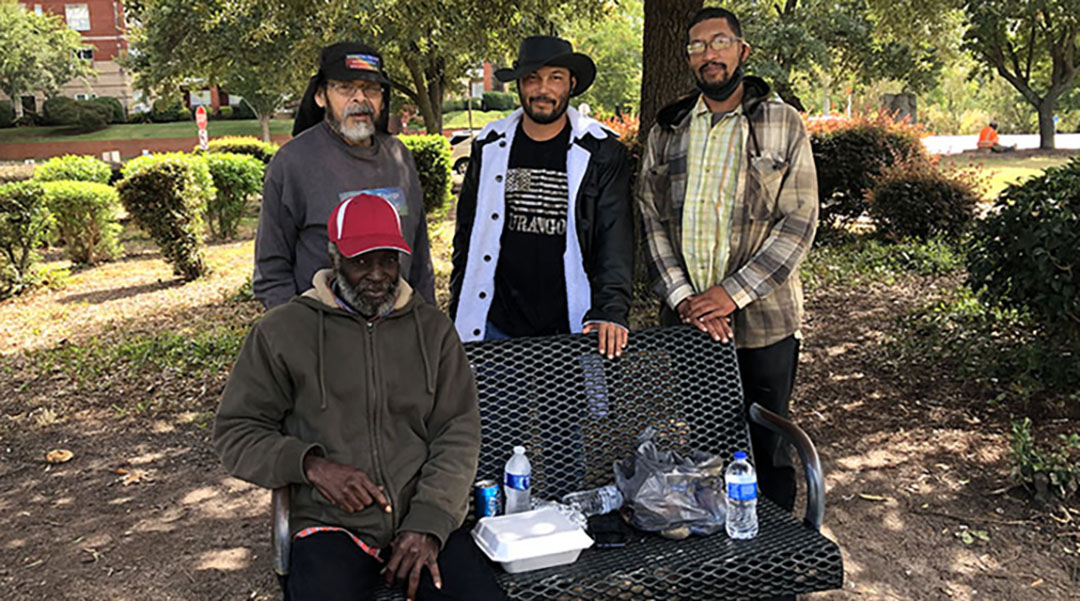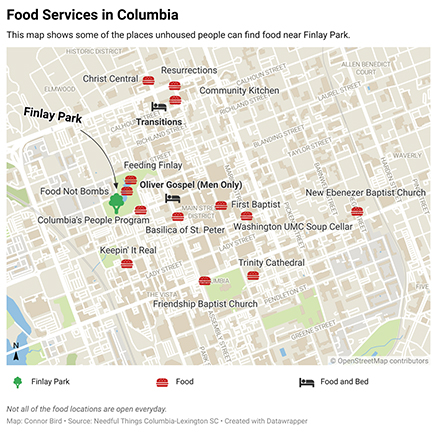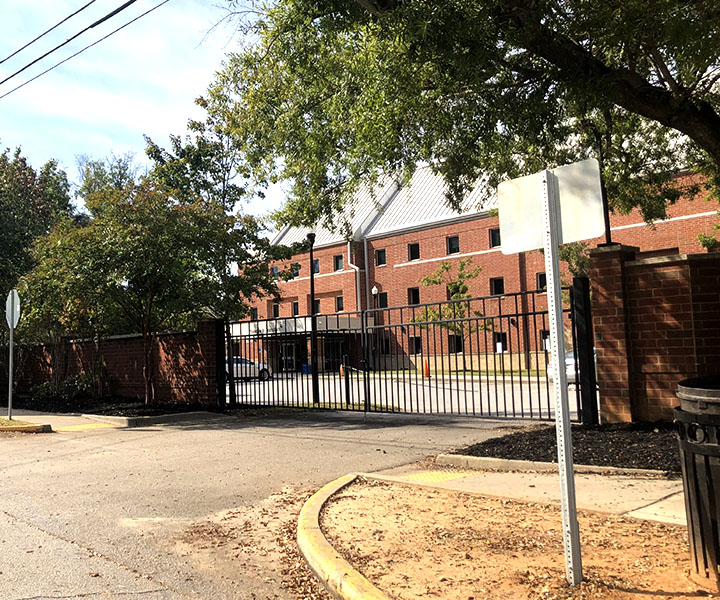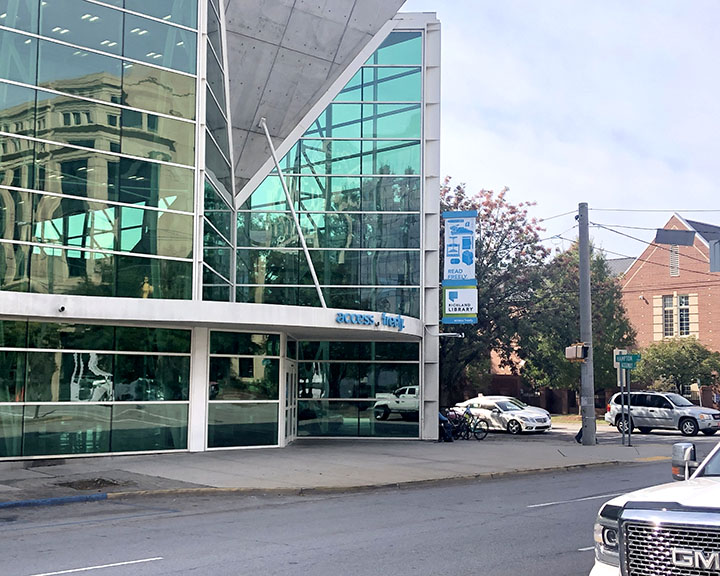Columbia resident Regi Solis, left, joins homeless friends Bobby Simmons, bottom left, Matthew Watterson, middle, and Thomas Lockwood III at Finlay Park on a Sunday afternoon. The four men meet at Finlay Park on Sundays to catch up. (Photos by Connor Bird)
Bobby Simmons, Matthew Watterson and Thomas Lockwood III are three homeless friends who meet on Sundays at Finlay Park to catch up and get food from local homeless advocacy organizations.
As the city of Columbia looks to a multi-million dollar renovation of the park, the question of what to do with the homeless who gather there has returned to the spotlight. The Carolina News and Reporter spent a few days in the park recently talking to the three friends to better understand why they come here, how they ended up homeless and why downtown’s Finlay Park is their preferred spot.
Matthew Watterson became homeless after a romantic break-up.
“Me and my old lady split up,” Watterson said. “Well, basically, I was in survival mode. What am I going to do? You just survive.”
“Matt isn’t a bad person,” said Nick Watterson, Matthew’s brother, who lives in Greenville. “He just keeps putting himself in bad situations.”
“The first thing that I did was look for the library,” Matthew Watterson said. “I needed to find resources. At some point, I took a break, found out there was a park here, and then started meeting people and started learning the game.”
For Simmons and Watterson, “the game” means recognizing that the park is the center of Columbia’s homeless community. Both think the park is a valuable asset. They say this is where everyone knows to meet and find resources and food.
“I know it’s not perfect, and I know it’s not pretty,” Watterson said. “But all these people come to this park. It keeps people out of the city. You got the (Oliver Gospel Mission) right there, you got Transitions right there. It’s always been like this. I think they would be wasting energy trying to stop people from coming here.”
A third major resource nearby is the main branch of the Richland County Public Library.
All three men say they spend their days either at the park or the library, on Assembly Street. The library offers a variety of homeless resources, including social workers.
The three say the city has done a good job providing resources.
“I think that the government has done a good job helping people,” Watterson said.
Non-profits also help, handing out meals in the park on Sundays.
According to some family members of the three men, the city and non-profits may be providing too many resources.
Lockwood, who was born and raised in Columbia, said he has been homeless in multiple states over the past decade. He said he works at a local Chinese restaurant, though he declined to say which one. Even though he has a job, he said the thought of finding a place to live and living a more domestic life is too hard.
“I’ve been homeless long enough where I’ve gotten to a point where I have gotten too comfortable,” said Lockwood. “I would have to step out of my comfort zone to live that way again.”
His brother, Eli, struggles with Thomas’ outlook.
“The general public treats them like trash, (but) homeless people have the opposite opinion — they think people who have jobs can provide handouts,” Eli Lockwood said. “I think there should be a program to help encourage those who are so used to being homeless. I was a homeless veteran. I know the struggle and how people treat us if they know you’re homeless.”
Simmons became homeless about a year ago. He said he was struck by a truck in a hit-and-run incident which the perpetrator was not found. He said he suffered from leg injuries and ended up losing his job and home. The Carolina News and Reporter could not immediately confirm the incident.
“I am just stuck in this situation,” Simmons said. “I was run over by a truck. I wasn’t able to do my job anymore, and they never found the guy who hit me.”
Simmons said he was a tree trimmer before the incident.
“I have pins and rods in my leg, so I can’t do that right now,” he said. “Luckily, some doctors were able to help me.”
Simmons said he found a doctor at the Medical University of South Carolina in Charleston who agreed to treat him at no cost. According to Simmons, doctors did not think that he would be able to walk again, but he said he proved them wrong. He added that he is scheduled to have another surgery.
“I hope that after (that) surgery I can work again,” he said.
Each of the three men has their own “secret spot” elsewhere in the city where they sleep. The park closes at 9 p.m. None of them like staying in local shelters.
“Transitions is available for everyone to come and get services, and we want people to come and get housing,” said Craig Currey, CEO of Transitions homeless shelter, which is a few blocks from the park. “Transitions is not for everyone, which can be hard for service providers who want people to get housing.”
All three recognize that their presence, and the presence of other homeless people, make the park less enticing for the general public. Nevertheless, Watterson believes replacing the park as a gathering space will be hard.
“I think they should keep Finlay how it is but keep an eye on it,” Watterson said. “This is what has always been going on. Honestly, I don’t even think that their intention is to get us out. … Once they close this park (to the homeless), where do you think all these people are going to go? They are going to go into the city.”
But all three may soon be forced out. The city has unveiled a $21.5 million plan to renovate the park next year. Additionally, a homeless task force created by City Council announced plans to build 50 single-occupancy, tiny home-style pallet structures to house people who frequent the park. The goal is to offer an alternative for people who do not like to stay in group shelters, which would help clear the park of homeless before the renovations begin.
All three men said they are aware of the new shelter homes being built but aren’t sure they would qualify to be placed in the new pallet homes. The city said the new shelter homes will be ready in November.
A map of local resources for homeless people to get food throughout the week. (Graphic by Connor Bird)
Transition is a local shelter for homeless people in Columbia. This shelter is the Midland’s largest.
The Richland Public Library is where many homeless people go during the day. The library has social workers who specialize in helping the homeless.





